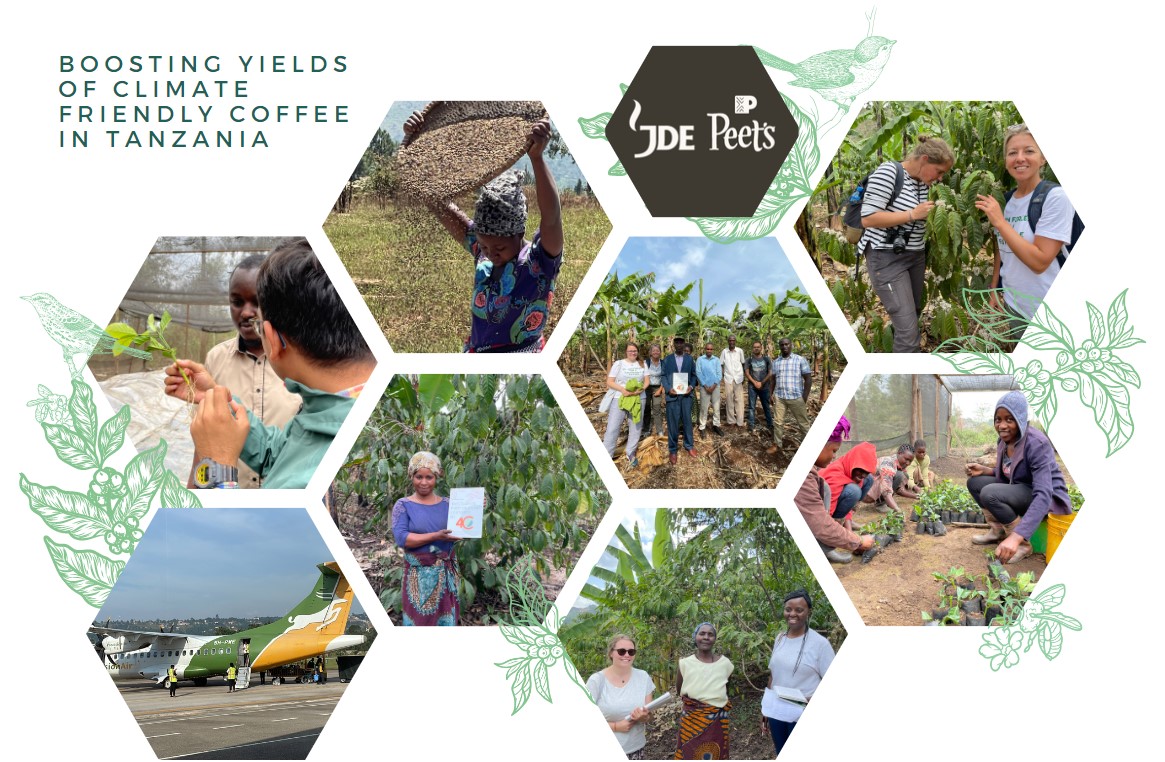develoPPP Project: Boosting yields for climate friendly Robusta coffee in Tanzania

Project title: Reduced GHG emissions and increased yields from Robusta coffee production by 7,000 smallholder farmers and processors in Tanzania
Project objectives:
To reduce GHG emissions from the production of Robusta coffee by 7,000 smallholder farmers and processors in Tanzania within the JDE Peet’s supply chain through the following actions:
- measuring and assessing the carbon footprint of coffee production
- identifying core impact factors and potential for improvement
- implementing mitigation strategies (including GHG emissions in- and off-setting)
- supporting market uptake of climate friendly coffee
- creating positive socio-environmental benefits for the farmers and local communities of the coffee sector in Tanzania and beyond
Project Management: 4C Services GmbH
Project financed by:The develoPPP.de Project* is financed by the Deutsche Investitions-und Entwicklungsgesellschaft mbH (DEG Impulse) from public funds of the German Federal Ministry for Economic Cooperation and Development (BMZ), together with funds of JDE Peet’s and 4C Services GmbH.
Implementing partners: Touton S.A., Karagwe District Cooperative Union, 4C Services, Meo Carbon Solutions and GRAS Global Risk Assessment Services.
Project period: 08/2021 – 07/2024
Project background
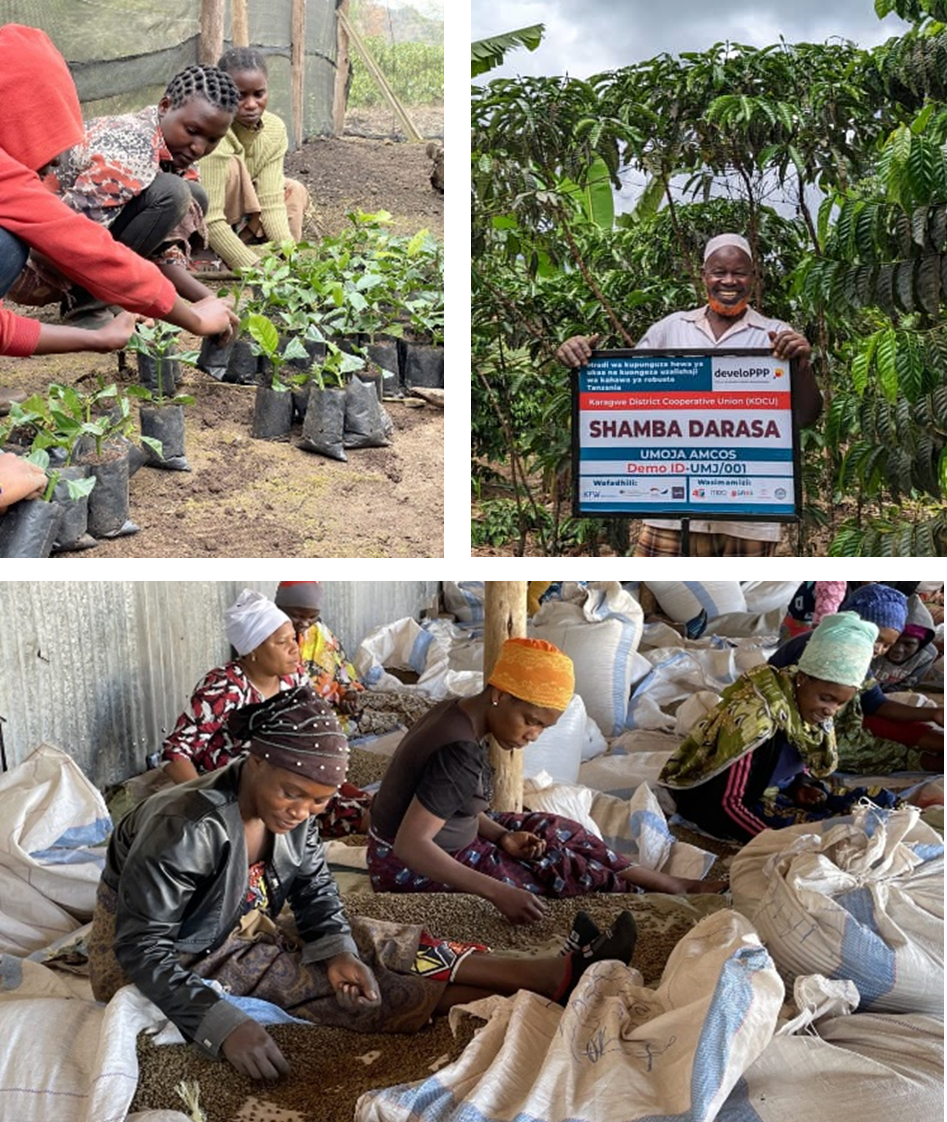 As the world seeks solutions to face the reality of climate change, the importance of mitigating the effects of greenhouse gas (GHG) emissions becomes increasingly significant. Coffee production and its value chain rank highly in GHG emissions, yet it simultaneously plays a key role in sustaining millions of livelihoods around the world. Tanzania is no exception. The total GHG emissions from Tanzania in 2014 were 286.49 million metric tons of carbon dioxide equivalent (MtCO2e), totaling 0.59% of global GHG emissions. Of these emissions, land-use change and the forestry sector account for 72.7% followed by agriculture, contributing 17.3% (Climate links, 2014). These GHG emissions are however expected to increase with intensified natural forest conversion for agricultural cropland.
As the world seeks solutions to face the reality of climate change, the importance of mitigating the effects of greenhouse gas (GHG) emissions becomes increasingly significant. Coffee production and its value chain rank highly in GHG emissions, yet it simultaneously plays a key role in sustaining millions of livelihoods around the world. Tanzania is no exception. The total GHG emissions from Tanzania in 2014 were 286.49 million metric tons of carbon dioxide equivalent (MtCO2e), totaling 0.59% of global GHG emissions. Of these emissions, land-use change and the forestry sector account for 72.7% followed by agriculture, contributing 17.3% (Climate links, 2014). These GHG emissions are however expected to increase with intensified natural forest conversion for agricultural cropland.
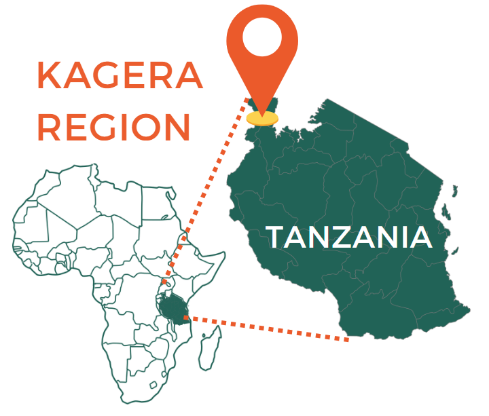
The project region, Kagera, in the northwest of Tanzania, already bears evidence of these developments. The region lost 34.5 kHa of tree cover between 2001 and 2019, which is equivalent to almost 6 Mt of CO2 emissions. Research projects have identified specific GHG emissions hotspots in the Tanzanian coffee supply chain that need to be addressed with efficient reduction measures.
With this project, 4C and its implementation partners are helping to bridge the gap by facilitating a better understanding of the different drivers of emissions. Based on this, appropriate reduction and off-setting measures are identified and adopted along the supply chain. The project activities include the sensitization of farmers on climate-smart agriculture and the need to protect soil carbon.
The project objectives are achieved through the implementation of the following work packages:
1. Measuring GHG Emissions
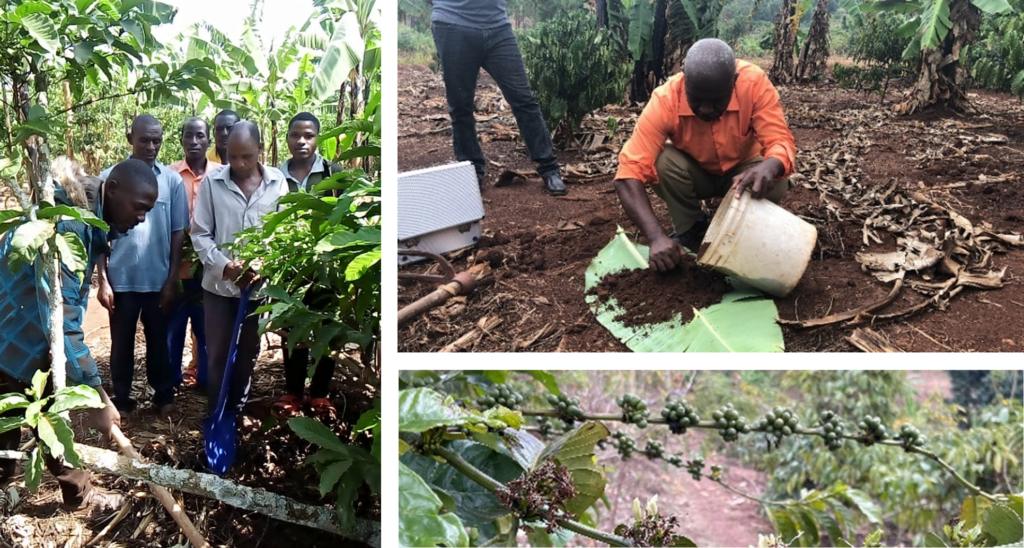
Measuring initial GHG emissions is the first crucial step to understand and quantify the negative environmental impact of coffee production in the project region. By March 2022, this first major phase of the project was completed with the mapping of the JDE Peet’s coffee supply chain in the region to allow for an adequate baseline measurement of GHG emissions. Based on the mapping results, Meo Carbon Solutions conducted an in-depth baseline study to calculate actual GHG emissions with the support of KDCU, the local coffee cooperative and Touton, the international supply chain manager. Data was collected from 126 coffee farmers and 13 Agricultural Marketing Cooperative Societies (AMCOS).
The baseline data collection is being complemented by the work of Global Risk Assessment Services (GRAS) who are conducting a land use change analysis to determine the potential deforestation risk areas within the project region. In addition, soil samples were collected from the 126 sampled coffee farms to determine the baseline soil organic carbon content. The baseline study provides an in-depth understanding of the drivers and amounts of GHG emissions emitted along the Robusta coffee supply chain in the Kagera region. Other activities that 4C and its partners carried out under this work package include the development of a transparent GHG calculator, as well as the setting up of a monitoring and evaluation system.
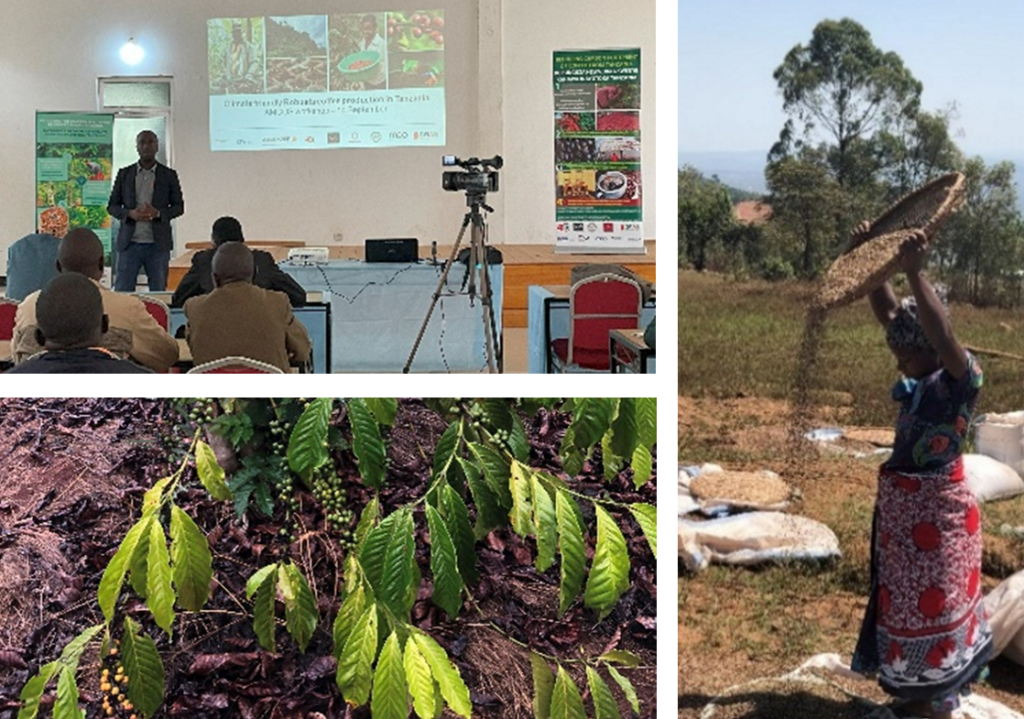
2. GHG reduction and carbon accumulation measures
The results from the baseline study supported the identification of potential emission reduction strategies as well as in-setting opportunities. 4C, Meo Carbon Solutions, JDE Peet’s, Touton and KDCU have been working together very closely to identify suitable measures and to provide technical and financial support to farmers to implement the identified measures.

As part of these measures, a training curriculum tailored to the context of the project region has been developed to support farmers in the implementation of climate-smart agricultural practices. The training material was tested in the field and feedback from trainers and target groups has been integrated into the final training material. Training sessions with farmers have started in the beginning of 2023.
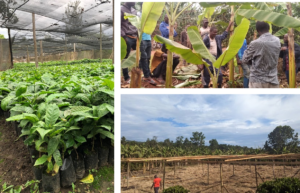
To support additional emission reduction and carbon removals within the supply chain, as part of the project, a nursery for shade tree seedlings is being constructed. In this nursery, seedlings for macadamia, mango, avocado and other local shade trees will be grown and handed out to the farmers participating in the project. The seedlings will grow into shade trees and support farmers in creating an optimal climate on their coffee farm, besides storing carbon and providing additional income opportunities to the farmer’s household through the sale of the fruits.
The emissions identified in the analysed supply chain are comparably low. Nevertheless, further research will explore carbon offsetting options to enable reasonable compensation for unavoidable GHG emissions. Implementing the strategies will create sustainable market opportunities, support farmers in their efforts towards climate change mitigation and at the same time facilitate coffee companies in Europe and beyond to achieve their climate neutrality goals.
3. Market uptake of climate friendly coffee in Europe
4C has developed a Climate Friendly Add-On to be used on top of our core standard. The farmer groups participating in this project in the Kagera region are among the first 4C users implementing this new feature. The 4C Unit obtained their 4C Climate Friendly certification in September 2022.
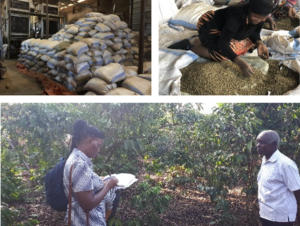 Awareness-raising campaigns are being conducted to distinguish coffee with reduced GHG footprint and the 4C Climate Friendly label is increasing its market uptake in Europe. The long-term viability and continuous market uptake of Climate Friendly green coffee from the project region will be ensured through credible high-level sustainability certification, marketing and communication campaigns and the development of local and international partnerships.
Awareness-raising campaigns are being conducted to distinguish coffee with reduced GHG footprint and the 4C Climate Friendly label is increasing its market uptake in Europe. The long-term viability and continuous market uptake of Climate Friendly green coffee from the project region will be ensured through credible high-level sustainability certification, marketing and communication campaigns and the development of local and international partnerships.
4. Dissemination of Project results
The project results will be disseminated within the project region and beyond through multistakeholder workshops with relevant actors from Tanzania and neighbouring countries. After testing the developed training curriculum on climate-smart coffee production in the context of the project, it will be distributed within the 160 AMCOS in the region, together gathering almost 65,000 farmers. These measures will promote climate-smart coffee production beyond the implementation scope of the project.
Expected Project Impact
- GHG emissions in the targeted supply chain are measured and regularly monitored to reach a reduction of 15 -20%
- Around 7,000 farmers and supply chain actors receive technical and financial support for the implementation of the GHG reduction and carbon in-setting measures through training activities and demonstration plots
- Climate Friendly certification of the coffee farmers in the project area and market uptake of 6,000 tons of Climate Friendly certified coffee in Europe
- Increased awareness and knowledge transfer of project outputs in Tanzania and neighboring countries to allow for the replication of good practices.
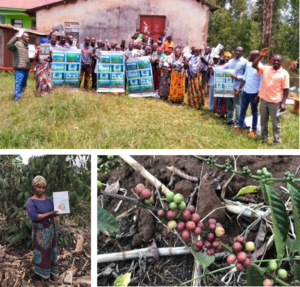 This project is impact-driven, and so is 4C. We intend to conduct further projects in cooperation with brand owners such as JDE Peet’s – in different regions and with different objectives. Improving the livelihood of coffee farmers and safeguarding biodiversity and carbon stocks are always key concerns for 4C though.
This project is impact-driven, and so is 4C. We intend to conduct further projects in cooperation with brand owners such as JDE Peet’s – in different regions and with different objectives. Improving the livelihood of coffee farmers and safeguarding biodiversity and carbon stocks are always key concerns for 4C though.
Results of the project and the impact on the ground will be reported and learnings from the project will be used to further improve the robustness of the 4C system.
Our project partners
JDE Peet’s
 The project partner JDE Peet’s is the world’s leading pure-play coffee and tea company, serving approximately 4,500 cups of coffee or tea per second. JDE Peet’s sources coffee from diverse coffee growing areas, processes the beans, and sells coffee in more than 100 countries with a portfolio of over 50 brands. Tanzania is an important coffee origin and coffee growing supports the livelihoods of many smallholder farmers. Our Common Grounds programme carries out long term farmer initiatives to increase sustainable coffee production, regenerative agriculture and improve the livelihoods of smallholder coffee farmers. As part of the company’s global sustainability targets and as a result of this project, JDE Peet’s will be sourcing climate friendly coffee free from deforestation and with limited carbon emissions from Tanzania.
The project partner JDE Peet’s is the world’s leading pure-play coffee and tea company, serving approximately 4,500 cups of coffee or tea per second. JDE Peet’s sources coffee from diverse coffee growing areas, processes the beans, and sells coffee in more than 100 countries with a portfolio of over 50 brands. Tanzania is an important coffee origin and coffee growing supports the livelihoods of many smallholder farmers. Our Common Grounds programme carries out long term farmer initiatives to increase sustainable coffee production, regenerative agriculture and improve the livelihoods of smallholder coffee farmers. As part of the company’s global sustainability targets and as a result of this project, JDE Peet’s will be sourcing climate friendly coffee free from deforestation and with limited carbon emissions from Tanzania.
Meo Carbon Solutions
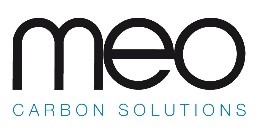 Meo Carbon Solutions is an independent consulting company with longstanding experience in sustainability. They are active in Europe, South-East Asia, Africa, and the Americas and they manage projects for public and private sector clients. Meo’s projects regularly involve the participation of stakeholders from industry, agriculture, NGOs, research institutions and public authorities. Within the scope of the develoPPP project, Meo performed a baseline greenhouse gas (GHG) emission calculation covering the coffee supply chain in Tanzania, followed by the support of the implementation of emission reduction activities and the monitoring of future emission levels. Meo’s analysis covers activities such as cultivation, processing, storage, transportation, and distribution of coffee to the final client.
Meo Carbon Solutions is an independent consulting company with longstanding experience in sustainability. They are active in Europe, South-East Asia, Africa, and the Americas and they manage projects for public and private sector clients. Meo’s projects regularly involve the participation of stakeholders from industry, agriculture, NGOs, research institutions and public authorities. Within the scope of the develoPPP project, Meo performed a baseline greenhouse gas (GHG) emission calculation covering the coffee supply chain in Tanzania, followed by the support of the implementation of emission reduction activities and the monitoring of future emission levels. Meo’s analysis covers activities such as cultivation, processing, storage, transportation, and distribution of coffee to the final client.
Touton
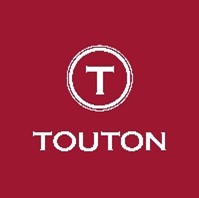 Forging a strong link between thousands of coffee producers and worldwide roasters, Touton is the global green coffee trader offering ambitious, responsible, and tailor-made services. Building on 15 years of experience, we offer all ranges of green coffee, Robusta, and Arabica, of which we master both the qualities and the complexities of supply chains. Through our vast and reliable network of partners and offices in Africa, Asia, and Latin America, we bring a unique and comprehensive expertise for innovative market intelligence, financial, logistics and sustainability services to meet our clients’ needs, with the highest degree of flexibility. Touton Group’s sustainability model of shared value creation is at the core of our coffee sourcing strategies. Beyond certification, we co-create with clients and growers, targeted and evolving sustainability programs to bring transformational change. Touton is also engaged in collective action through sectoral platforms such as the European Coffee Federation, the Global Coffee Platform and Sustainable Coffee Challenge
Forging a strong link between thousands of coffee producers and worldwide roasters, Touton is the global green coffee trader offering ambitious, responsible, and tailor-made services. Building on 15 years of experience, we offer all ranges of green coffee, Robusta, and Arabica, of which we master both the qualities and the complexities of supply chains. Through our vast and reliable network of partners and offices in Africa, Asia, and Latin America, we bring a unique and comprehensive expertise for innovative market intelligence, financial, logistics and sustainability services to meet our clients’ needs, with the highest degree of flexibility. Touton Group’s sustainability model of shared value creation is at the core of our coffee sourcing strategies. Beyond certification, we co-create with clients and growers, targeted and evolving sustainability programs to bring transformational change. Touton is also engaged in collective action through sectoral platforms such as the European Coffee Federation, the Global Coffee Platform and Sustainable Coffee Challenge
Karagwe District Cooperative Union (KDCU LTD)
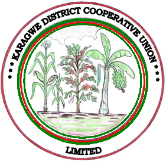 Karagwe District Cooperative Union Limited (KDCU LTD) is a Coffee Cooperative Organization located in North-West Tanzania, within Kagera region. It is a wholly farmer-owned cooperative organization with a membership of over 64,330 peasant coffee farmers, represented by 123 primary cooperative societies from across Karagwe and Kyerwa districts. KDCU aims at increasing coffee production and quality to enhance coffee farmers’ incomes and livelihoods.
Karagwe District Cooperative Union Limited (KDCU LTD) is a Coffee Cooperative Organization located in North-West Tanzania, within Kagera region. It is a wholly farmer-owned cooperative organization with a membership of over 64,330 peasant coffee farmers, represented by 123 primary cooperative societies from across Karagwe and Kyerwa districts. KDCU aims at increasing coffee production and quality to enhance coffee farmers’ incomes and livelihoods.
KDCU Ltd is also vital in providing crop finance, transport, processing, grading, packaging and marketing its members’ coffees. The Union has an annual output of approximately 32,000MT of green coffee comprised of Robusta (97.5%) and Arabica (2.5%) varieties. Over 90% of the Union’s coffees are sold on the Tanzania Coffee Board national auction, and about 7% to specialty markets primarily in Germany, Japan, USA, Italy and Netherlands.
Global Risk Assessment Services
 GRAS is a comprehensive solution to implement and monitor sustainable and deforestation-free supply chains by the verification of compliance of relevant sustainability criteria using the latest remote sensing technologies. GRAS supports crop-specific mapping, quantification, and assessment of risks from deforestation, grassland conversion, and other environmental parameters, such as fire, water shortage, drought, and erosion, from the field to the country level.
GRAS is a comprehensive solution to implement and monitor sustainable and deforestation-free supply chains by the verification of compliance of relevant sustainability criteria using the latest remote sensing technologies. GRAS supports crop-specific mapping, quantification, and assessment of risks from deforestation, grassland conversion, and other environmental parameters, such as fire, water shortage, drought, and erosion, from the field to the country level.
GRAS conducted a detailed Land Use Change Assessment for the project, through a semi-automated analysis based on remote-sensing technology. GRAS uses current and historic satellite images and EVI Enhanced Vegetation Index time series to detect and verify actual land-use change activities as well as to identify potential GHG emissions due to deforestation or conversion of other high carbon stock areas.
* develoPPP Program

develoPPP.de is a program launched by the German Federal Ministry for Economic Cooperation and Development (BMZ) in 1999 in order to foster the involvement of the private sector in areas where business opportunities and development policy initiatives overlap. The BMZ appointed public partners to implement the program on its behalf: DEG Impulse and GIZ.
